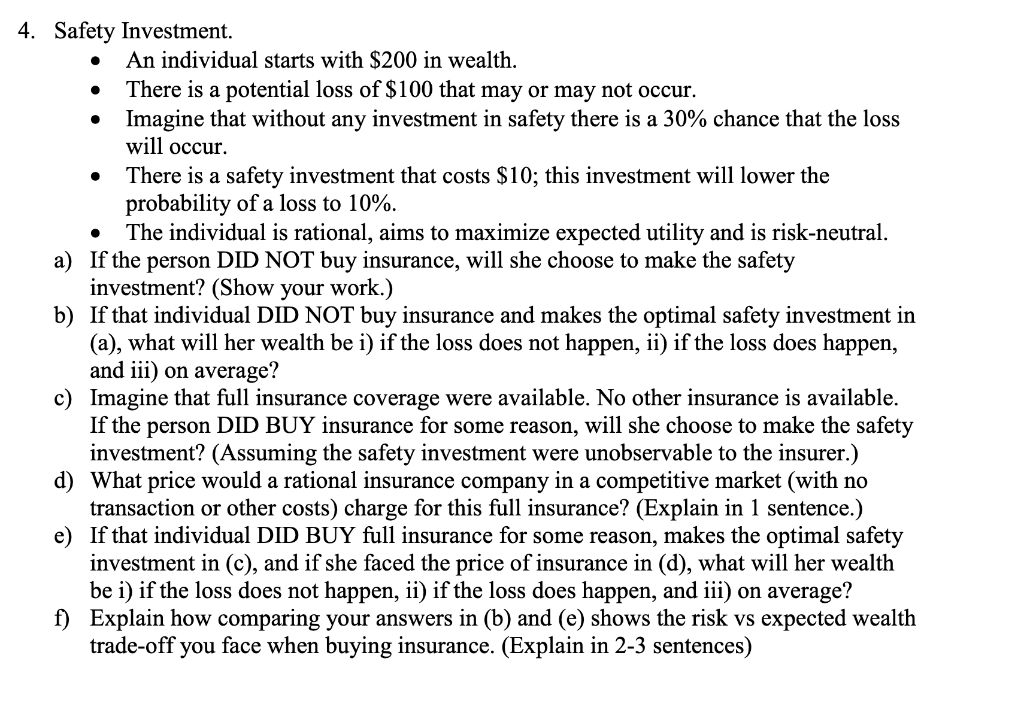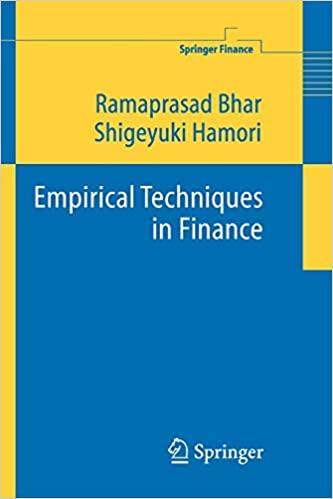
4. Safety Investment. An individual starts with $200 in wealth. There is a potential loss of $100 that may or may not occur. Imagine that without any investment in safety there is a 30% chance that the loss will occur. There is a safety investment that costs $10; this investment will lower the probability of a loss to 10%. The individual is rational, aims to maximize expected utility and is risk-neutral. a) If the person DID NOT buy insurance, will she choose to make the safety investment? (Show your work.) b) If that individual DID NOT buy insurance and makes the optimal safety investment in (a), what will her wealth be i) if the loss does not happen, ii) if the loss does happen, and iii) on average? c) Imagine that full insurance coverage were available. No other insurance is available. If the person DID BUY insurance for some reason, will she choose to make the safety investment? (Assuming the safety investment were unobservable to the insurer.) d) What price would a rational insurance company in a competitive market (with no transaction or other costs) charge for this full insurance? (Explain in 1 sentence.) e) If that individual DID BUY full insurance for some reason, makes the optimal safety investment in (c), and if she faced the price of insurance in (d), what will her wealth be i) if the loss does not happen, ii) if the loss does happen, and iii) on average? f) Explain how comparing your answers in (b) and (e) shows the risk vs expected wealth trade-off you face when buying insurance. (Explain in 2-3 sentences) 4. Safety Investment. An individual starts with $200 in wealth. There is a potential loss of $100 that may or may not occur. Imagine that without any investment in safety there is a 30% chance that the loss will occur. There is a safety investment that costs $10; this investment will lower the probability of a loss to 10%. The individual is rational, aims to maximize expected utility and is risk-neutral. a) If the person DID NOT buy insurance, will she choose to make the safety investment? (Show your work.) b) If that individual DID NOT buy insurance and makes the optimal safety investment in (a), what will her wealth be i) if the loss does not happen, ii) if the loss does happen, and iii) on average? c) Imagine that full insurance coverage were available. No other insurance is available. If the person DID BUY insurance for some reason, will she choose to make the safety investment? (Assuming the safety investment were unobservable to the insurer.) d) What price would a rational insurance company in a competitive market (with no transaction or other costs) charge for this full insurance? (Explain in 1 sentence.) e) If that individual DID BUY full insurance for some reason, makes the optimal safety investment in (c), and if she faced the price of insurance in (d), what will her wealth be i) if the loss does not happen, ii) if the loss does happen, and iii) on average? f) Explain how comparing your answers in (b) and (e) shows the risk vs expected wealth trade-off you face when buying insurance. (Explain in 2-3 sentences)







